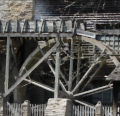The Feast of the Ascension is traditionally celebrated on the fortieth day after Easter. Actually, it should be said "the fortieth day of Easter," since Easter is counted as day one in this reckoning. In my diocese, and in many others, it's been moved to the following Sunday. This is unfortunate, as I'll get into later. In the traditional calendar of the Church (which really ought to be restored - see Pray for Release from Purgatory for Whoever Invented Ordinary Time) the Ascension is considered so significant that it marks not only a feast, but the start of a minor season within Paschaltide. The days from the Ascension to the Pentecost are called "Ascensiontide." The Ascension ought to be restored to this level of attention in the Church.
The Ascension represents a bookend to several events in the life of Jesus. The most obvious for most people is the Resurrection. After Jesus rose, He spent some time with His Apostles (forty days is the traditional number), teaching them intensively and giving the Great Commission, after which He needed to return to the Father so that He could send the Holy Spirit, Who would show them "all things." The Ascension highlights, therefore, that the Resurrection of Jesus and our own resurrection are not for this world, but are for the Father's kingdom, which is given to Christ. The Ascension's relation to the Resurrection is explicitly manifested in the planning of the liturgical calendar, which links the celebration of the two events, along with that of the Pentecost.
Considering the Ascension, not in the context of the liturgical progression of feasts and seasons, but as an event in history, we can see its significance relative to other events. For example, the Ascension is also a bookend to the Incarnation, which we celebrate at the Feast of the Annunciation. At the Incarnation, the Second Person of the Trinity took on human nature, acquiring both a human body and a soul. At the Ascension, that Person, the whole Person, now both human and divine, returned to the Father from whence He came.
But there's more. By ascending to the Father, Jesus manifests to us what our destiny is if we live in fidelity to Him: We, too, will be taken up to the Father and the Father, who reveals Himself in Jesus, will also fill us up so that we will "be like Him, for we will see Him as He is." In this sense, the Ascension bookends not just the Incarnation of Jesus, which is a "descent" of sorts, but also the fall of Adam which is the descent of all of mankind. The Resurrection is the first fruits of the sacrifice of Christ on the Cross, but the Ascension manifests the full restoration of that which Adam lost for mankind, which is union with the Father.
There's one other consideration of the Ascension. In my opinion it's the one that deserves the most attention, since it drives all the others; it's the least obvious, though, since the Scriptural accounts don't directly convey it. At the end of Matthew, Jesus gave those with Him a promise: Know that I am with you always, even unto the end of the age. By reading this as the very last verse in Matthew, along with the accounts of the Ascension provided in Luke and in Acts, it's clear this promise is being made on the occasion of the Ascension. This promise is, in a sense, fulfilled by the coming of the Holy Spirit and His continued animation of the Church. However, the promise is fulfilled in an even more concrete (albeit veiled) way: By Jesus' Real Presence in the Holy Eucharist.
I used to wonder why Jesus didn't stick around after the Resurrection. He could easily have made Himself present for teaching, encouragement, and Holy conversation with all the believers throughout the world as His Church spread. But that would have been short of an even greater gift: that of becoming one with those believers. Instead of just being present to His Church, Jesus had it in mind to be present in His Church, to literally unite, not just in spirit, but in flesh, blood, and soul, with His Bride. Even if one doesn't accept that the last words in Matthew were specifically spoken on the occasion of the Ascension, it's clear that Jesus ascended, among other things, for the purpose of making Himself available to us in the Holy Mass.
In this sense, the Ascension bookends the Institution of the Holy Mass at the Last Supper - another event that occurred on a Thursday, and the beginning of the Easter Triduum. To restore attention to this, the universal Church could require all diocese in the Latin Rite to permanently restore the celebration of the Feast of the Ascension to its rightful time on Ascension Thursday. Short of that, perhaps someone will suggest to the bishops in the United States that this would be a fitting way for their own dioceses to participate meaningfully in the Eucharistic Revival currently under way.
